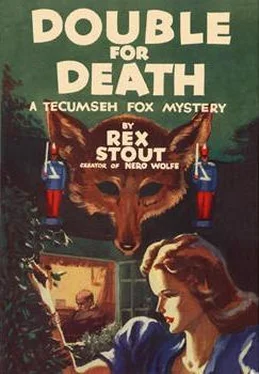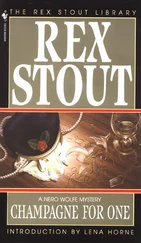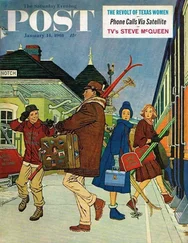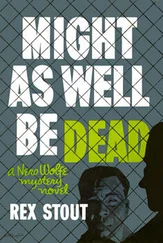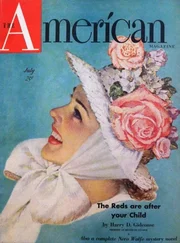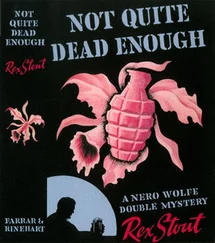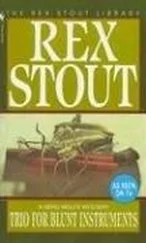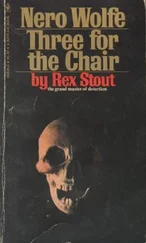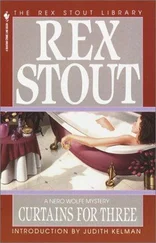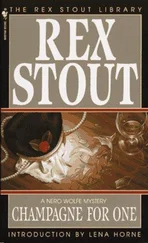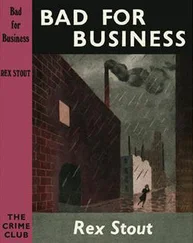Fox shook his head. “Not unless I go along.”
“You’ll be staying here a while.”
“Then there’ll be no searching at my house without a warrant. I can’t prevent your talking with the occupants. There are plenty there to talk with.”
“Very well.” Derwin was crisp. “You spoke of being sore. So am I. Colonel Brissenden didn’t exhaust the list of your contributions to this case. I hope you won’t mistrust the police so thoroughly when we’re through with it. Men will be stationed immediately on all sides of this house. You will not attempt to leave the house or to communicate with any one outside of it; otherwise, you will be arrested and held as a material witness. If and when you change your mind and decide to come clean, I’ll be here ready for you — Take him out.”
Fox, standing in the side hall, glanced at his wrist and saw it was half-past six. The expression in his eyes was a rare one, that of irresolution. For immediate exploration he had to choose between two trails and which should it be, a gun or a murderer? Resentment and wrath impelled him to the first, but sharp sense spoke for the second, since that inquiry had been already too long delayed by the jostle of events. A third desire was struggling for the field of his attention, but that he ignored, knowing as he did that his violent inclination to go outdoors was a childish reaction to the circumstance that he had been commanded to stay in the house.
Sense won; and since his own roaming was now restricted, he decided to find a button somewhere and ring for a servant. In the first room to the right of the hall, a small bare one which apparently functioned in the winter as a conservatory, there seemed to be no button; and in the adjoining one the need for a button disappeared. It was enormous and high-ceilinged, and still, judging by its furnishings, clung to its pretensions to the old-fashioned appellation of drawing room. In a corner of it, four people were seated talking in subdued tones. Fox had no desire for conversation with Fuller the lawyer or McElroy the multiple director, but the other two were Miranda and Vaughn Kester, so he approached.
“Excuse me,” he said abruptly, “but things are happening. I know of no reason why I shouldn’t tell you. They found an old Zimmerman revolver in Thorpe’s safe, fired bullets with it and learned that it was used to kill Corey Arnold Sunday night. Did your father own a Zimmerman revolver, Mrs. Pemberton?”
She was looking up at him with a frown. “Heavens, I don’t know. But I know he didn’t kill that Arnold man. I knew my father better than—”
“Excuse me. Did he, Kester?”
“Own a Zimmerman revolver? No. Mr. Thorpe hated guns and would have nothing to do with them.” Kester’s eyes were incredulous. “What you say is absolutely impossible, that they found the gun that killed Arnold—”
“Then you didn’t know it was in the safe?”
“Certainly not! And I wouldn’t believe it—”
“Excuse me. Here’s another one. The Zimmerman is an old German revolver and can’t be traced by sales records. But the one they found on the library floor today is an American pistol, a Dowsey, and can be so traced, and has been. I bought it in 1936 and have had it ever since. It’s mine. It’s the gun that shot Ridley Thorpe. I have no idea — what’s the matter, Mrs. Pemberton?”
Miranda had done more than blink; she had kept her eyes closed to Fox’s darting gaze for a full three seconds. Now his eyes were boring into hers and she was meeting them. “What’s the matter?” he repeated.
“Nothing,” she declared, in a voice perfectly composed. “Why?”
Fox did not blink. “As I observed a while ago, you have extraordinary control of your nerves. That private talk we were having got interrupted. I’d like to go on with it at your convenience. All right?”
“Certainly.” Miranda made a movement. “I have no doubt Mr. Fuller and Mr. McElroy—”
“Oh, no, it can wait until you’ve finished with them. I was looking for Mr. Kester. If the rest of you can spare him—”
Fuller put in caustically, “It seems to me, Mr. Fox, that you have your hands full right now, in view of your admission regarding the weapon found in the library.”
“It wasn’t an admission, Mr. Fuller. They proved it and confronted me with it. I am confined to this house and will be arrested as a material witness if I try to leave it. Sure my hands are full. Among other things, Mrs. Pemberton has engaged me to investigate the two murders. Is that correct, Mrs. Pemberton?”
Miranda, looking at him, allowed her head to move barely perceptibly, down and up.
“That’s correct, isn’t it?” he insisted.
“Yes,” she said, loud enough to carry six feet.
Fuller demanded, “You’re acting for Grant, aren’t you?”
“I am. That’s all right, I’m licensed. If I betray the interest of one employer to the advantage of another, they can take my license away and put me in jail — Mr. Kester, will you take me somewhere for a talk? I need to ask you some things that I would have asked long ago if someone hadn’t shot Mr. Thorpe with my gun.”
Kester looked at Miranda. She nodded. Kester said, “All right, as soon as I’m through here.”
Fox shook his head. “I’m sorry, but it’s urgent. It gets more urgent every minute.”
Fuller said emphatically, “I strongly advise you, Mrs. Pemberton, and you too, Kester, to use the utmost discretion in choosing—”
“Excuse me.” Fox’s eyes were into Miranda’s again. “I say it’s urgent. More so even than finishing my talk with you. If a bomb’s going to explode, don’t you think it would be better to light the fuse ourselves?”
She said, “Will you, Vaughn? Please?”
“Now?”
“Please.”
Kester got up, told Fox, “We’ll go up to my room,” and led him off.
If was Fox’s first trip upstairs. The upper corridor was broad and softly carpeted, and paneled in wood. The room into which Kester ushered him, a spacious chamber trying to look cool in white rugs and chair covers and counterpanes, was like an oven, with the late afternoon sun mercilessly glaring in. Evidently the household routine, which must have included drawn shades on the west side after lunch, had been disrupted by events. Kester lowered awnings, removed his coat and tossed it on a bed, and pulled a chair around to face the one Fox had taken.
“When,” he demanded, “did Mrs. Pemberton engage you to investigate this?”
“Outdoors a while ago.” Fox got up to remove his coat too, and sat again. “We have a lot of ground to cover, Mr. Kester, and we’ll have to cut corners and move fast. Are you on their list of suspects, or have you an alibi?”
“I have no alibi.” It was astonishing how chilly the secretary’s eyes could look in that furnace of a room. “Colonel Brissenden’s interview with Mr. Thorpe had just ended, and I had escorted him from the library and turned him over to Bellows to let him out the back way, the shortest way to his car. At the moment I heard the shot I was in the conservatory, on my way to get Mr. McElroy and the others, thinking they were on the front terrace. The sound of the shot paralyzed me. I am not a man of action. Then I started to run back to the library, and caught my foot in the rug in the hall and fell. I scrambled up and went on. Mr. Thorpe was there on the floor, on his face, and as I stood there staring at him a second, unable to move, there was a convulsive twitch to his legs and then he was still. My next action was to pay you a compliment.”
“Thank you very much. What was it?”
“I yelled for you. I yelled your name several times.” The twist on the secretary’s lips was presumably a smile. “I suppose I had been impressed by your handling of the job you had done for Mr. Thorpe.”
Читать дальше
